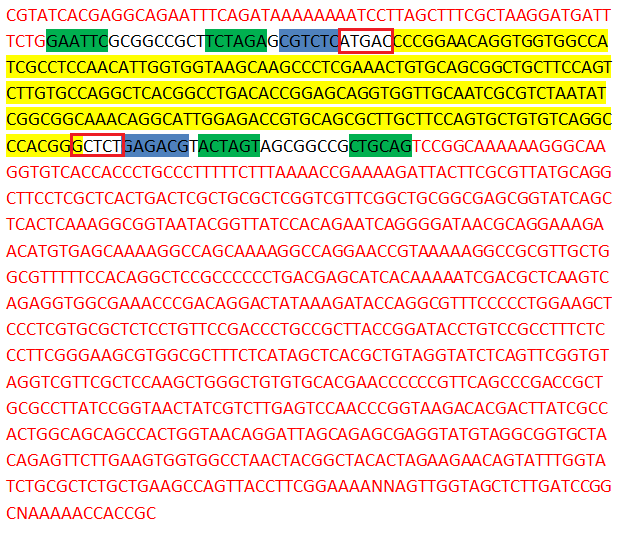Team:Freiburg/Project/Results
From 2012.igem.org
(→Results) |
(→Results) |
||
| Line 3: | Line 3: | ||
=<span style="color:#2244AA">Results = | =<span style="color:#2244AA">Results = | ||
| - | <div align="justify">On this page we want to present some of our results or in other words | + | <div align="justify">On this page we want to present some of our results, or in other words, deliver proof for the functionality of our toolkit |
| Line 9: | Line 9: | ||
| - | The creation of a toolkit with 96 different parts | + | The creation of a toolkit with 96 different parts not only means a lot of labwork but also a lot of organisational tasks, sequencing and analysis. We don't want to bore you with the 96 sequences of our finished biobricks, but we want to give you one example of a finished biobrick and highlight some of the interesting and important strips in its sequence. If you are interested in the other sequences, just have a look at our parts section and go to the registry of standard biological parts. |
| Line 17: | Line 17: | ||
| - | In this sequence of our biobrick AA1 the main features of all our biobricks are highlighted. In yellow you can see the direpeat itself, the green parts are | + | In this sequence of our biobrick AA1 the main features of all our biobricks are highlighted. In yellow you can see the direpeat itself, the green parts are iGEM restriction sites (a requirement for all biobricks), the red, written sequence is part of the psb1C3 vector, the yellow part is the direpeat itself, the blue sequences are recognition sites for BsmB1 and the red boxes are the cutting sites of BsmB1. |
| Line 23: | Line 23: | ||
| - | + | What's so great concerning our toolkit is not that it has 96 parts but that these parts are able to form fully functional TAL effectors. Now, to get from the toolbox to the finished TAL effector, you need a few things:six direpeats, one effector backbone, three enzymes and a PCR machine. If you throw all this together it's what is called Golden Gate Cloning (GGC). In this part we want to show you the results of our trials with the finished biobricks and the sequencing of built TAL effector constructs. | |
Revision as of 17:00, 24 September 2012
Results
The toolkit
The creation of a toolkit with 96 different parts not only means a lot of labwork but also a lot of organisational tasks, sequencing and analysis. We don't want to bore you with the 96 sequences of our finished biobricks, but we want to give you one example of a finished biobrick and highlight some of the interesting and important strips in its sequence. If you are interested in the other sequences, just have a look at our parts section and go to the registry of standard biological parts.

|
In this sequence of our biobrick AA1 the main features of all our biobricks are highlighted. In yellow you can see the direpeat itself, the green parts are iGEM restriction sites (a requirement for all biobricks), the red, written sequence is part of the psb1C3 vector, the yellow part is the direpeat itself, the blue sequences are recognition sites for BsmB1 and the red boxes are the cutting sites of BsmB1.
Creation of TAL sequences - Golden Gate Cloning -
What's so great concerning our toolkit is not that it has 96 parts but that these parts are able to form fully functional TAL effectors. Now, to get from the toolbox to the finished TAL effector, you need a few things:six direpeats, one effector backbone, three enzymes and a PCR machine. If you throw all this together it's what is called Golden Gate Cloning (GGC). In this part we want to show you the results of our trials with the finished biobricks and the sequencing of built TAL effector constructs.
 "
"
